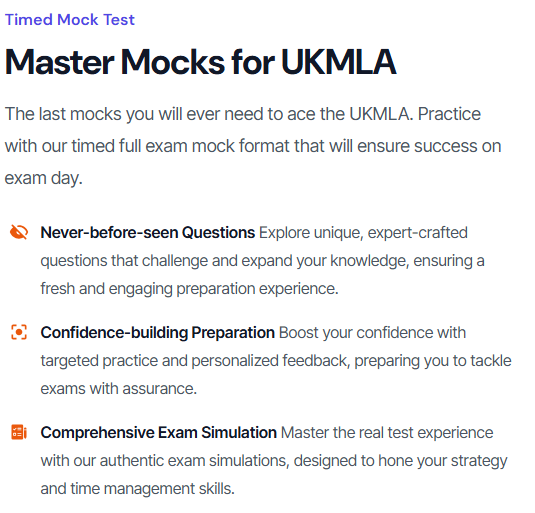How to prepare for PLAB1 or UKMLA AKT

How do I prepare for PLAB/UKMLA 1?
What books do I study?
Where can I get PLAB/UKMLA materials from?
Is this exam hard?
PLAB1 or UKMLA AKT isn’t a walk in the park. Yes, there are question banks and materials everywhere, but please don’t take the preparation lightly thinking questions will repeat exactly the similar to past papers/recalls. The aim of the preparation is to always understand why the other four of the options are not the answer.
With a well-structured strategy, the use of high-quality resources like ultimate RoadToUK Qbank and Master Mocks, and consistent study habits, you can navigate the preparation process with confidence. Here's a detailed guide to help you make the most of your preparation time.

The Ultimate UKMLA Qbank
With thousands of high-quality, peer-reviewed questions made by experienced UK doctors, you can rest assured that you'll be prepared come exam day.
Understanding the Exam Structure
The first step in your preparation journey should be familiarising yourself with the exam structure. Both PLAB 1 and the UKMLA AKT are designed to assess your ability to apply medical knowledge in clinical scenarios. The exams consist of 180 multiple-choice questions that are designed to test not only your knowledge, but also your ability to make quick, clinical decisions under pressure. Understanding the format and types of questions you will face is crucial, as it will guide your study approach and help you focus on the areas that matter most.
Step 1: Set Clear Goals and Create a Study Timeline
Given that the Qbank provided by Road to UK contains over 3,400 questions across various medical disciplines, it's essential to create a realistic study plan. Begin by setting clear goals—both long-term and short-term.
For instance, if you have three months to prepare, you might decide to complete the entire Qbank in this period. To do so, aim to answer around 35 questions per day. This allows you to cover the entire breadth of material systematically, ensuring that you touch on all the critical areas outlined in the MLA content map.
Additionally, divide your study sessions into focused periods where you can concentrate on specific topics or weaker areas. This will not only help you manage your time effectively, but also ensure that you have enough time to revisit and revise difficult topics closer to the exam.
Step 2: Make the Most of Qbank
The Qbank from Road to UK is one of the most valuable resources at your disposal. The questions are designed to closely mirror the actual exam format, providing a realistic practice experience. The Qbank is categorised according to the MLA content map, making it easy for you to focus on specific areas.
Utilize the customizable study modes to tailor your practice sessions according to your needs. For example, you can focus on specific categories, such as cardiology or gastroenterology, depending on where you need the most practice. The Qbank also offers the ability to flag questions, which is an excellent way to mark challenging questions for later review.
Step 3: Track Your Progress with Personalised Analytics
One of the standout features of the Road to UK Qbank is the personalised analytics tool. This tool tracks your performance across different categories, allowing you to see where you excel and where you require more work. Regularly reviewing these analytics can provide you with insights into your strengths and weaknesses, helping you adjust your study plan accordingly.
For instance, if you notice that you're consistently scoring lower in paediatrics, you can allocate more time to this area in your study schedule. This targeted approach ensures that you're not just covering material, but actively improving in areas where you're less confident.
Step 4: Engage with Master Mocks
Master Mocks are an essential component of your preparation. These timed practice exams simulate the actual test environment, helping you build the stamina and time management skills needed to perform well on the day of the exam. Regularly taking these mock exams will also help reduce exam anxiety, as you become more familiar with the pressure of timed tests.

Master Mocks for UKMLA
The last mocks you will ever need to ace the UKMLA. Practice with our timed full exam mock format that will ensure success on exam day.
Master Mocks also provide immediate feedback, which is invaluable for your preparation. Review your performance after each mock exam, paying particular attention to the questions you got wrong. This reflection will help you identify any recurring mistakes or gaps in your knowledge, allowing you to focus your revision efforts more effectively.
Step 5: Regular Revision and Retesting
Revision is a critical part of the learning process. As you progress through the Qbank, make use of the revision notes feature. Save explanations for difficult questions, and revisit these notes regularly. The ability to reset the entire Qbank and reattempt it is another powerful tool—use it to reinforce your knowledge after completing the initial round of questions.
Consider setting aside time each week for dedicated revision sessions, where you focus solely on reviewing flagged questions and revisiting challenging topics. This consistent revision will help ensure that information is retained and that you're continuously improving in areas where you may have initially struggled.
Step 6: Maintain Balance and Consistency
Finally, while it's important to be dedicated to your preparation, it's equally crucial to maintain a balance. Overloading yourself can lead to burnout, which is counterproductive. Ensure that your study schedule includes breaks, and don’t hesitate to take a step back if you’re feeling overwhelmed. Consistency is key—regular, focused study sessions are more effective than cramming.
Engage with online communities or study groups where you can discuss difficult questions and share insights. Sometimes, explaining concepts to others can solidify your own understanding.
Do I need any book to study for this exam?
Sometimes the explanations won’t satisfy your curiosity or clarify the question. That’s where the Oxford Handbook of Clinical Medicine and Oxford Handbook of Clinical Specialities come in. The former more than the latter, in my opinion. It’s not necessary to know everything from these books. But if you can grow the habit of looking up the question related topics, then by the end of your prep, you will see you’ve read a lot of this book. But don’t go crazy and try to cram everything. These should be only the ultimate reference book when you are stuck with a question. Use free materials like Patient Info or NICE guidelines if you still have doubts.
GMC has also provided an MLA Content Map so that you can have a general understanding of what topics to expect in the exam. The blueprint will tell you what you can expect to be covered by the questions in part 1, but it won’t tell you what questions or scenarios you will face on the day you take the tests.
Conclusion
Preparing for the PLAB 1 or UKMLA AKT is undoubtedly challenging, but with the right resources and a well-structured plan, it’s entirely manageable. The comprehensive RoadToUK Qbank and Master Mocks offer an excellent foundation for your study. By setting clear goals, regularly tracking your progress, engaging with realistic practice exams, and revising consistently, you can approach the exam with confidence and be well on your way to success.

